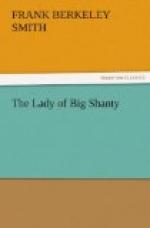It began to drizzle—a drizzle of no importance, but it cooled the faces of those who were ill.
In an hour Big Shanty Brook had sacrificed three miles of its shore in self-defence. Its bend above the nodding cedars—where Thayor had killed his deer—had succeeded in turning the course of the fire. The shore upon which the refugees stood was untouched. The brook in the chaos of running fire had saved their lives.
Still the fire roared on and although the torrent kept it at bay it went wild in the bordering wilderness. The burned camp was now a forgotten incident in this devilish course of flame. The northeast wind had not failed. The woods became a fire opal—opaque in smoke, with the red glint of innumerable trees glowing in gleaming strata, marking the course of the wind. Many a bird fluttered and dropped in a vain effort to escape from the heat—the heat of a blast furnace. The hedgehog being lazy and loath to move—lay dead—simmering in his fat. The kingfisher jeered in safety—never before had he seen so many little dead fish. It was a gala day for him. They stuck against charred branches conveniently in shallow, out-of-the-way pools. He sat perched on the top of a giant hemlock chattering over his good luck. The chipmunk, at the first sinister glare, had skittered away to safety. He had not had a wink of sleep and his little nose was as black as his hide from running over charred timber. Often it was a close squeak with him to keep from burning his feet.
Nothing can tear through a forest like a fire. Its speed is unbelievable; it strikes with the quickness of a cat—slipping out myriads of snake-like tongues right and left into the dryest places. It reasons—it decides—rarely it pardons. It is more dangerous than an incoming sea; the sea gives warning—the fire gives none. Your death is only one of many—a burned detail. The forest fire has a leap which is subtle—ferocious. Things it misses it goes back for until they crumble and are devoured at its edge. It cuts with the sweep of a red-hot scythe. All this occurs above the surface. What happens beneath is worse. It gnaws with the tenacity of a cancer deep into the ground, lingering hidden until suspicion has passed; then it asserts itself in a new outbreak in places least suspected. When it is all over the region lies desolate for years. It becomes a waste, a tangle of briers—pitiful upstarts of trees and burned stumps.
Had it not been for the trapper’s and the Clown’s forethought the fugitives would have fared worse. They had managed to rescue a nondescript collection of clothing, blankets, mackintoshes, socks, brogans and two teamsters’ overcoats from the partly destroyed lower shanty. In the storehouse adjoining they, with Blakeman’s assistance, found three hams, matches, a sack of flour, some tea, half a sack of beans and a few cooking utensils. Everything else had been stolen, including possibly the new stock of provisions Thayor had telegraphed for, the debris of two new boxes and the gray ashes of excelsior giving little doubt that the new provisions had arrived. Holt and Skinner had only time to bundle these valuables together when the fire reached them. Heavily loaded they managed to regain the others keeping along the edge of the torrent.




